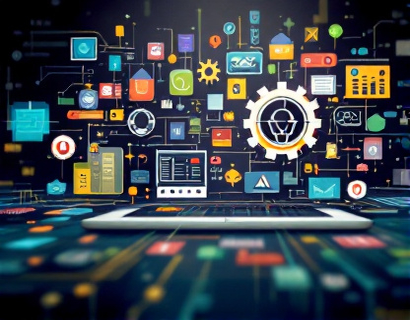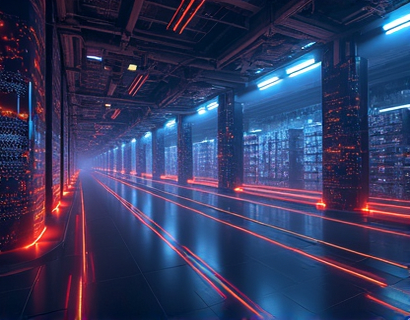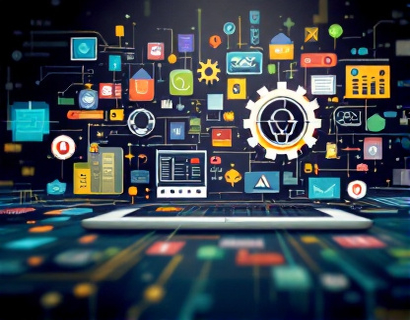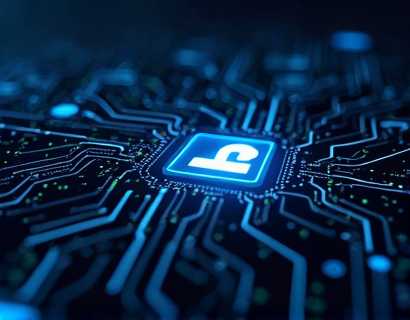AI & Blockchain Integration: A Business User's Essential Guide to Seamless Digital Transformation and Growth
The integration of Artificial Intelligence (AI) and Blockchain technology represents a pivotal shift in the digital landscape, offering businesses unprecedented opportunities for innovation, efficiency, and growth. This guide serves as an essential resource for business leaders aiming to navigate the complexities of integrating these cutting-edge technologies. By providing actionable strategies, this article aims to streamline operations, enhance security, and unlock new growth opportunities in the digital transformation journey.
To begin, it's crucial to understand the individual capabilities and potential of AI and Blockchain before exploring their synergistic integration. AI, with its ability to analyze vast datasets, learn from patterns, and make decisions with minimal human intervention, has revolutionized industries ranging from healthcare to finance. Its applications include predictive analytics, automated customer service, and personalized marketing strategies. On the other hand, Blockchain, known for its role in cryptocurrencies, offers a decentralized, transparent, and secure way to record transactions and manage data. Its immutable ledger ensures data integrity and reduces the risk of fraud.
The integration of AI and Blockchain can lead to transformative outcomes. For instance, AI can enhance the efficiency of Blockchain networks by optimizing consensus mechanisms, reducing energy consumption, and improving transaction processing speeds. Conversely, Blockchain can provide AI systems with a secure and transparent source of data, ensuring the integrity of machine learning models and enhancing trust in AI-driven decisions.
Streamlining Operations with AI & Blockchain
One of the primary benefits of integrating AI and Blockchain is the streamlining of business operations. AI can automate routine tasks, freeing up resources for more strategic activities. When combined with Blockchain, these automation processes gain an additional layer of security and transparency. For example, in supply chain management, AI can predict demand and optimize inventory levels, while Blockchain ensures that every transaction and movement of goods is recorded and verifiable. This dual approach minimizes errors, reduces delays, and enhances overall efficiency.
Another area where AI and Blockchain can significantly impact operations is in contract management. Smart Contracts, self-executing contracts with the terms directly written into code, can be powered by AI to automate and enforce contractual obligations. AI can analyze data to predict potential issues and suggest optimal contract terms, while Blockchain ensures that all parties adhere to the agreed terms in a transparent manner. This combination not only speeds up processes but also reduces the need for intermediaries, lowering costs and increasing trust among parties.
Enhancing Security through AI & Blockchain
Security is a paramount concern in the digital age, and the integration of AI and Blockchain offers robust solutions. Blockchain's inherent security features, such as cryptographic hashing and decentralized consensus, make it an ideal technology for protecting sensitive data. AI can further enhance these security measures by detecting and mitigating threats in real-time. Machine learning algorithms can analyze patterns and identify anomalies that may indicate a security breach, allowing for proactive measures to be taken.
For instance, in financial services, AI can monitor transactions for suspicious activities and flag potential fraud cases. When these transactions are recorded on a Blockchain, the immutable nature of the ledger ensures that once a transaction is recorded, it cannot be altered or deleted. This combination provides a high level of security and accountability, which is crucial for industries handling sensitive information such as healthcare and finance.
Moreover, AI can help in managing and securing IoT devices, which are increasingly integrated into business operations. AI algorithms can monitor the behavior of IoT devices, detect unusual patterns, and prevent unauthorized access. Blockchain can secure the communication between devices and the central system, ensuring that data transmitted is authentic and tamper-proof. This synergy is particularly important in industries like manufacturing and smart cities, where the reliability and security of IoT networks are critical.
Unlocking New Growth Opportunities
The integration of AI and Blockchain opens up new avenues for business growth and innovation. One significant opportunity lies in the creation of decentralized applications (dApps) that leverage the strengths of both technologies. dApps can offer new business models, such as decentralized finance (DeFi), which provides financial services without traditional intermediaries. These applications can attract new customers and create additional revenue streams for businesses.
Another growth opportunity is in the realm of data monetization. Blockchain ensures that data transactions are secure and transparent, while AI can analyze and derive value from large datasets. Businesses can sell anonymized and aggregated data to other organizations, creating a new revenue source. AI can also help in identifying valuable insights from data, which can be used to improve products and services, further driving growth.
Furthermore, the integration of AI and Blockchain can enhance customer experiences through personalized and secure interactions. AI-driven chatbots and virtual assistants can provide 24/7 customer support, while Blockchain ensures that customer data is protected and transactions are transparent. This combination not only improves customer satisfaction but also builds trust, leading to increased customer loyalty and retention.
Challenges and Considerations
While the benefits of integrating AI and Blockchain are substantial, businesses must be aware of the challenges and considerations involved. One of the primary challenges is the technical complexity of integrating these technologies. Both AI and Blockchain require specialized knowledge, and businesses may need to invest in training or hiring experts to navigate the implementation process effectively.
Another consideration is the regulatory landscape. As AI and Blockchain are relatively new technologies, regulations are still evolving. Businesses must stay informed about local and international regulations to ensure compliance. This includes data privacy laws, such as GDPR, and industry-specific regulations that may impact the use of AI and Blockchain.
Scalability is also a critical factor. While Blockchain networks are known for their security, they can face scalability issues, especially when handling a high volume of transactions. AI can help optimize Blockchain performance, but businesses need to carefully evaluate the trade-offs between security, speed, and cost. Additionally, the energy consumption of some Blockchain consensus mechanisms, like Proof of Work, raises environmental concerns, and businesses should explore more sustainable alternatives.
Implementing AI & Blockchain: A Step-by-Step Approach
For businesses looking to integrate AI and Blockchain, a strategic and phased approach is recommended. Here’s a step-by-step guide to get started:
- Assess Current Infrastructure: Evaluate your existing systems and identify areas where AI and Blockchain can add value. Consider the types of data you handle, the processes you want to automate, and the security requirements.
- Define Objectives: Clearly define the goals of your integration. Whether it’s improving efficiency, enhancing security, or creating new revenue streams, having clear objectives will guide your implementation strategy.
- Choose the Right Technologies: Select AI and Blockchain solutions that align with your objectives. Consider open-source platforms and frameworks that offer flexibility and community support.
- Pilot Projects: Start with small-scale pilot projects to test the integration. This approach allows you to identify and address potential issues without disrupting your entire operation. Focus on areas with clear benefits, such as supply chain tracking or customer service automation.
- Build a Skilled Team: Assemble a team with expertise in AI, Blockchain, and your specific industry. Continuous learning and upskilling are essential as these technologies evolve.
- Ensure Data Quality: High-quality data is crucial for AI algorithms and Blockchain transactions. Implement data governance practices to ensure accuracy, completeness, and consistency.
- Monitor and Optimize: Continuously monitor the performance of your AI and Blockchain integration. Use analytics to identify areas for improvement and optimize processes accordingly.
By following these steps, businesses can effectively integrate AI and Blockchain, unlocking the full potential of these technologies to drive digital transformation and growth.
Conclusion
The integration of AI and Blockchain represents a powerful combination that can transform businesses across various industries. By streamlining operations, enhancing security, and unlocking new growth opportunities, this synergy offers a competitive edge in the digital landscape. While challenges exist, a strategic and phased approach can help businesses navigate the complexities and reap the benefits. As the digital world continues to evolve, embracing AI and Blockchain integration will be essential for sustained success and innovation.










































